The world of programming is constantly evolving with new languages and emerging technologies. Currently, there are so many different programming languages out there, and it can be tough to determine which one is faster and better for your project. Different languages are designed for different purposes. A few languages are designed to be fast and efficient, while others are designed for ease of use or versatility.
A programming language can be judged on various factors – readability, syntax, library support, etc. But one of the most critical metrics is how quickly it can execute code. Therefore, this article will lead you through some key factors to consider in the programming languages comparison about in terms of speed. Also, we will list fastest programming languages for your reference.
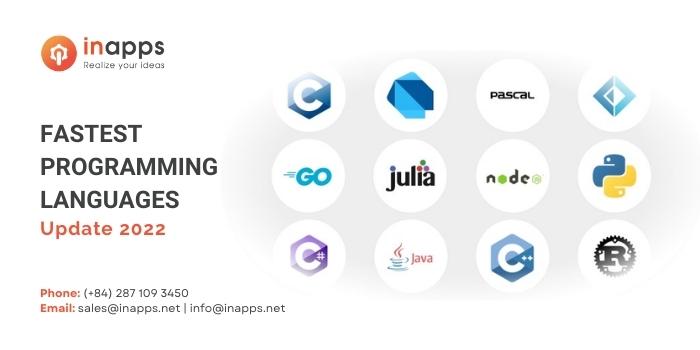
Which is the fastest programming language? Top 12 fastest coding language 2022
Fastest Programming Languages Speed Comparison: Three Main Factors to Consider
A fast programming languages means that programs can be made more quickly, which, in turn, means that bugs can be fixed more quickly. The ultimate goal of programming languages speed comparison is to test how fast each programming language executes its code and compare the results. It is essential to develop the same program in different languages to compare programming languages objectively. They must be given the same problem to solve. This gives us an idea of how long each one takes to accomplish the specific tasks.
So, what is the fastest programming language? Here are three factors in determining it.
- In computer programming, the factor you need to consider is whether the language supports multi-threading, which allows a program or task to be divided into different functions that can run simultaneously. Therefore, if you are writing a program that calculates big data sets or does data analysis, this ability to run the program using several cores at once will increase speed.
- Another critical factor is how fast your computer can run your code. A programming language with a quicker execution time means more processing power of the CPU and better performance, which makes it the fastest programming language performance.
- Another factor is how fast your code executes through the compiler (translator). Code that requires more time to compile, such as an entire program or a project, will make it longer for it to start running after compilation because the computer needs to read and interpret every line of code before running it. This slows down in start requires that the programming language has a fast startup time or shorter compilation time.
Understanding these factors to compare the fastest programming language in the world can help you decide which one to use depending on your project type.
Top 12 Popular Fastest Programming Languages
Here are the top 12 fastest programming languages you should put into consideration. There may be some cases in which one programming language might be faster than the others, but for the majority of the cases, the below list is acceptable:
C Language

fastest programming language C
You wonder whether Is c the fastest programming language? Below will be the correct answer.
C, also known as “the mother of all modern programming languages,” is a general-purpose and imperative high-level programming language with a bias for systems programming (system software).
Therefore, it can be written in any computer language and still retain its main properties. It was developed from 1972 to 1983 for the Unix operating system and is still used today. It runs faster than most other compiled or interpreted languages but compiles slowly. C language comes with built-in support for hardware programming, and therefore it is widely used in the industry. This makes it one of the top programming languages around.
C++
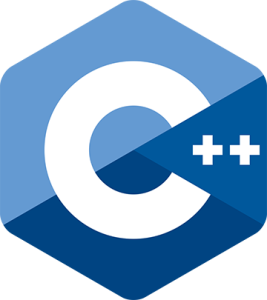
fastest programming language C++
C++ is a multi-paradigm programming language initially designed with a focus on imperative procedural as well as object-oriented styles of programming. Bjarne Stroustrup developed it as an extension of the C language as he wanted to add features that would directly support his experience in software development. C++ is used for creating system software, application software, high-end web applications, embedded software, etc.
It is a widely used language and helps you solve your problem faster. It makes use of both compile-time and run-time for executing its code, making it one of the most fastest programming language in 2023 around.
Rust
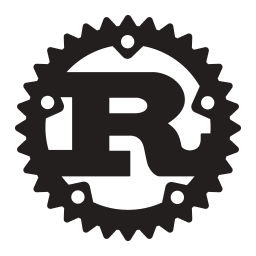
fastest programming language Rust
It is a relatively new programming language that has been designed to be no less than C++ but safer. It is a multi-paradigm, compiled programming language with support for both functional and imperative programming styles. Rust has a robust type system, and its syntax is pretty easy to learn. So, if you’re looking for an alternative to C/C++ to build applications that demand speed without compromising safety or control, Rust might be what you need. This language compiles fast too.
Rust runs faster than most other compiled programming languages like C/C++ because it has built-in support for hardware programming and constant precision integers so that you can process huge integers in this programming language without overflow or loss of accuracy. This makes it one of the top fastest programming languages today.
Dart

fastest programming language Dart
Google developed Dart in 2011. It is an object-oriented programming language. Programmers use it as a standalone language or as an embedded plugin/language for applications that use the Chromium browser. Like Rust, it also runs faster than most other compiled languages like C/C++ because it uses platform-independent bytecode and has built-in support for hardware programming. It compiles fast too.
Julia

fastest programming language Julia
Julia is a high-level, high-performance dynamic programming language designed for numerical computing tasks. By exploring the use of many advanced programming techniques, this programming language is specifically intended to address scientific computing requirements.
One of its main features includes multiple dispatches, which allow more flexible code and generality. It offers built-in types for numerous statistics and machine learning applications, making it the fastest computer language. Julia compiles slower than other languages but runs faster because of its blazing fast startup time.
Node.js

Node.js is a robust JavaScript-based and open-source run-time environment that executes code written in JavaScript on various platforms. It uses an event-driven, non-blocking input/output model that makes it lightweight and efficient. Node.js was released back in 2009 to support the development of web applications but has since evolved into a powerful general-purpose, highly-scalable programming language. It is used by companies like Yahoo and LinkedIn to build their applications and for other use cases like IoT (Internet of Things), robotics, etc.
Node.js uses an event loop that makes it faster than most web scripting languages like Python or Ruby. It supports high concurrency and processes requests in parallel. This makes Node.js one of the best programming language in terms of speed today. Node.js compiles fast also because it runs on Google’s V8 JavaScript engine that compiles the code into native machine instructions to make it run fast. Thus, allowing you to build your applications more quickly.
Java
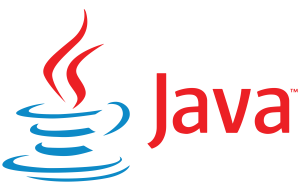
fastest programming language Java
This is a general-purpose Object-Oriented Programming (OOP) language that is concurrent, class-based, and object-oriented and thus supports the preceding programming styles like imperative, generic, and reflective. Java can be used in a wide range of applications and is supported by many IDEs and libraries.
Java compiles slower than other languages but runs faster because of its high-performing standard library. Its startup time is somewhere between C++ and C, but it still loses both of them in terms of speed.
One of the reasons that Java is slower than some other languages is because it uses a Java virtual machine. The Java virtual machine allows Java programs to run on different types of hardware and operating systems. This machine is not as fast as the hardware it is running on, which makes Java programs run a little slower than they would if they were running on the native machine. However, the Java virtual machine offers more portability than other programming languages.
C#
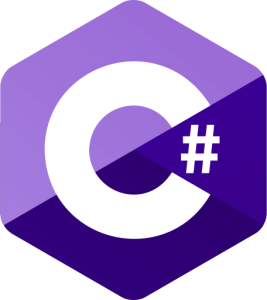
programming language C#
C# (pronounced as C Sharp) is a multi-paradigm language that can create both multi-threaded and non-multi-threaded programs. It is based on the Common Language Infrastructure (CLI), an open specification developed by Microsoft to specify its .NET framework stack. C# allows you to create a user interface for your program using Windows Forms or WPF.
C# compiles faster but runs slower than C++ and Java. Its startup time is even faster than other languages, making it a popular language in the industry today.
F#

fastest programming language F#
FSharp, or F#, is a multi-paradigm programming language that encompasses functional, imperative, and object-oriented styles. It was developed by Microsoft and used for writing applications on .NET platforms. It allows programmers to use imperative and functional programming styles, making it popular among many software developers.
High-performing components of FSharp include a managed memory model and flow-typed programming. It compiles faster than other languages but runs slower because it needs to perform garbage collection, which is a process of finding and removing the unused data from the computer’s memory to free up space for new data.
Pascal
Pascal is a procedural programming language created to use structured programming techniques. These include defining functions, calling them recursively, passing parameters by reference or value, and performing modular programming.
Its main drawback is its slow performance in comparison to other languages; Pascal compiles slowly but runs faster than many other languages because of the simple syntax and arrays.
Python
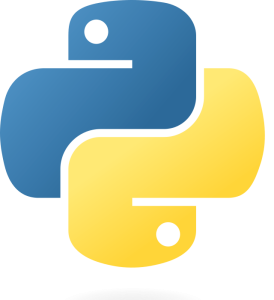
fastest programming language python
One of the best object-oriented programming languages allows programmers to use procedural, functional, and reflective paradigms. It also offers dynamic typing, making it easier for the programmer to create fast prototypes for less efficient applications than those developed in statically typed languages like C++.
Python compiles faster than other languages but runs slower because of its dynamic typing and lack of a standard library. It also lacks some built-in functions required for larger applications. However, packages written in Python can be easily reused because they are compatible with many other existing programming languages.
Go (Golang)

golang
Golang (or Go) is becoming a popular language because of its speed and reliability. It is an open-source programming language created at Google by Robert Griesemer, Rob Pike, and Ken Thompson as a better alternative to C++. Go also comes with a built-in garbage collection and dynamic memory management features, which make it a fast language. But its startup time is slow as opposed to other languages.
Go (Golang) has a lot of advantages like it never runs out of memory, requests are handled concurrently with an efficient race detector which makes Go perfect for web applications. However, unlike other programming languages that compile fast and run slowly, this one compiles slowly but runs fast.
Conclusion

fastest programming language
In brief, you can cut down the time it takes to develop a program by using the right programming language. It is essential to know which programming language will work best for your new projects. Therefore, being aware of the fastest programming languages will help you make better decisions.
In this post, we have looked at the top 12 fastest programming language list for coding and some factors to make a programming language speed comparison. So, if you’re looking for a programming language that’s fast and efficient to use, be sure to consider this list.
Source: InApps.net
Let’s create the next big thing together!
Coming together is a beginning. Keeping together is progress. Working together is success.



















